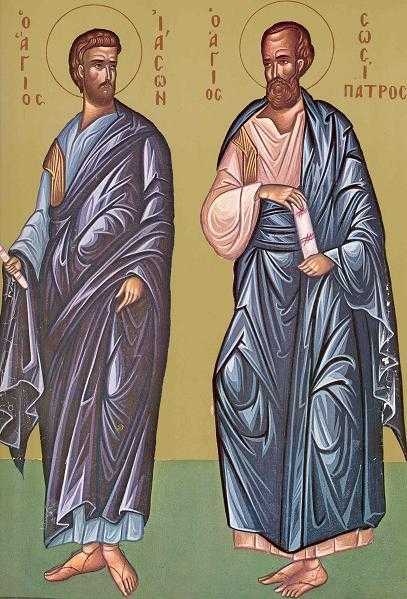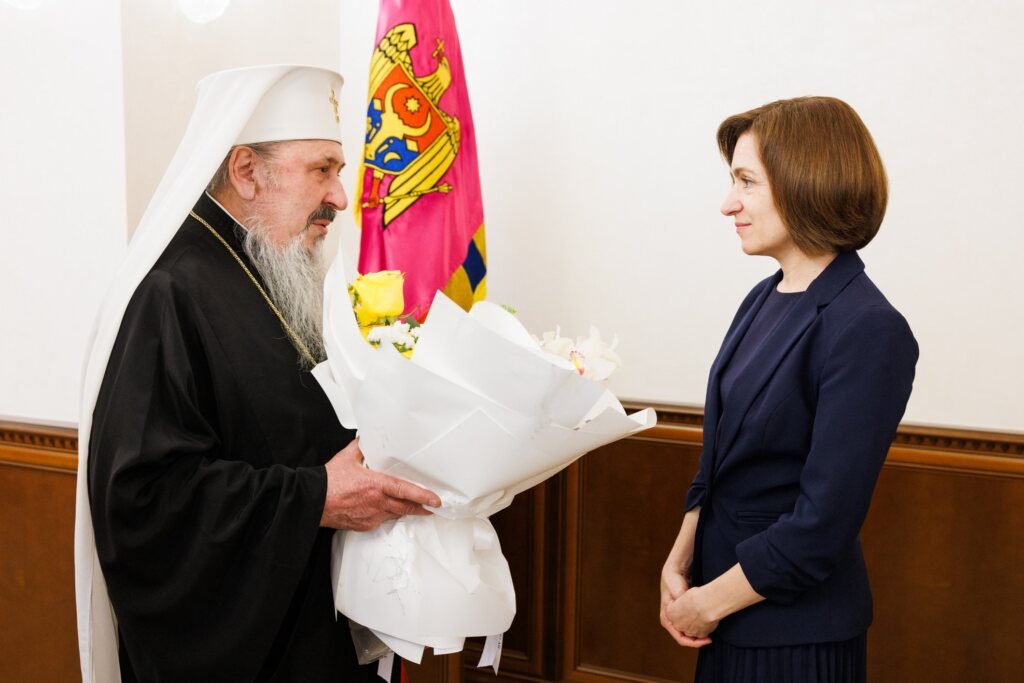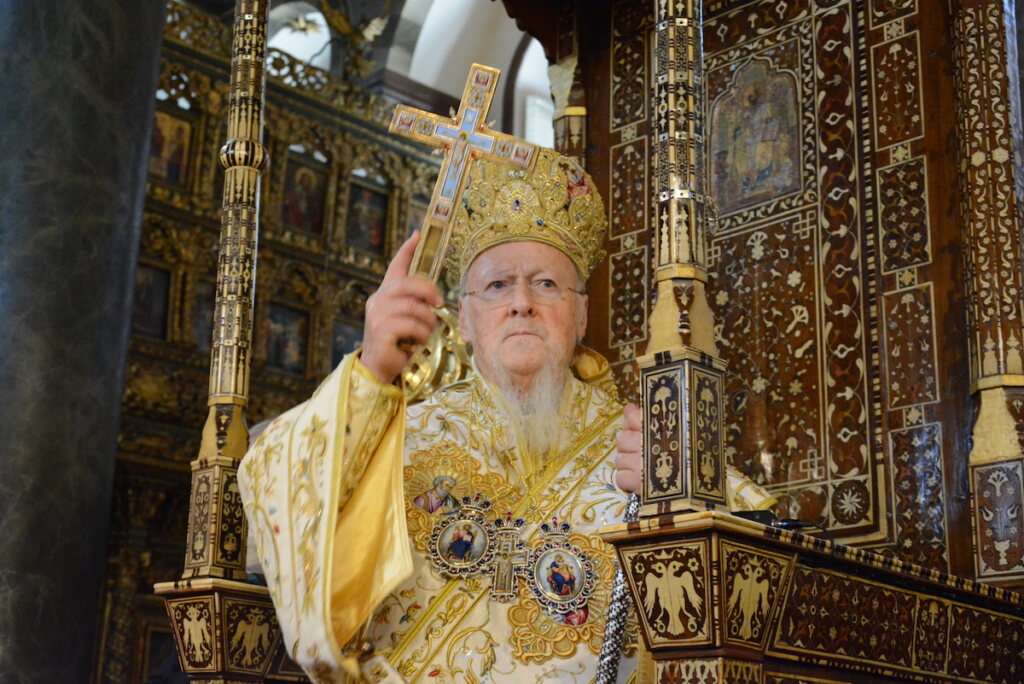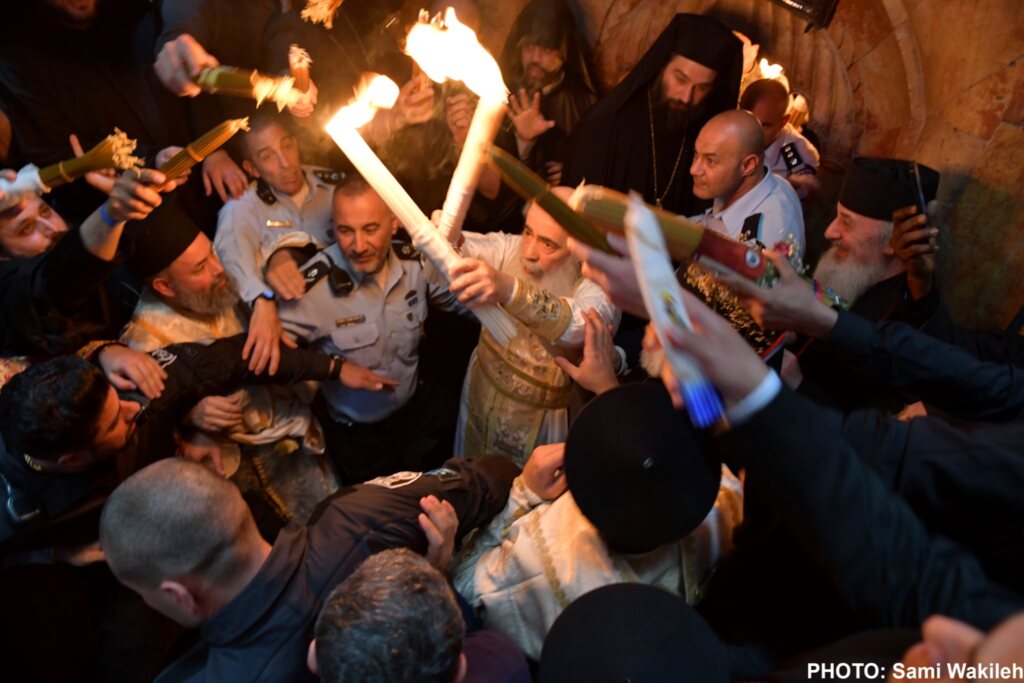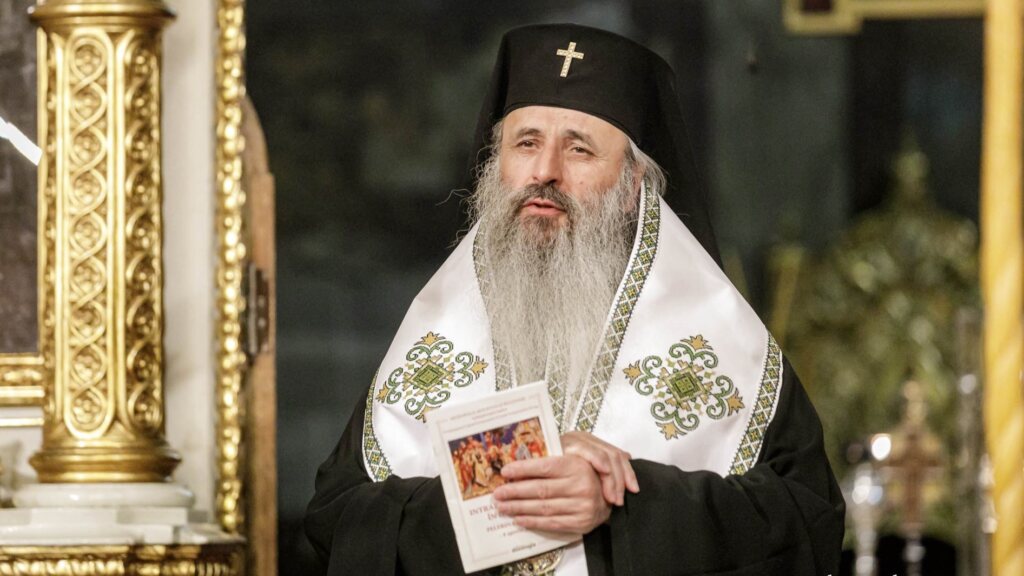Orthodox Calendar, April 28
Apostle Jason
He was from Tarsus (Asia Minor). He was the first Christian in the city. The Apostle Sosipater was a native of Patra, Achaia. He is thought to be the same Sosipater mentioned in Acts 20:4. They both became disciples of Saint Paul, who even called them his kinsmen (Rom 16:21).
Saint John Chrysostom (Homily 32 on Romans) says that this is the same Jason who is mentioned in Acts 17:5-9. Saint Jason was made bishop in his native city of Tarsus, and Saint Sosipater in Iconium. They traveled west preaching the Gospel, and in 63 they reached the island of Kerkyra [Korfu] in the Ionian Sea near Greece.
There they built a church in the name of the Protomartyr Stephen and they baptized many. The governor of the island learned of this and locked them up in prison, where they met seven thieves: Saturninus, Iakischolus, Faustianus, Januarius, Marsalius, Euphrasius and Mammius. The Apostles converted them to Christ. For their confession of Christ, the seven prisoners died as martyrs in a cauldron of molten tar, wax and sulfur.
The prison guard, after witnessing their martyrdom, declared himself a Christian. For this they cut off his left hand, then both feet and finally his head. The governor ordered the Apostles Jason and Sosipater to be whipped and again locked up in prison.
When the daughter of the governor of Kerkyra (Korfu), the maiden Kerkyra, learned how Christians were suffering for Christ, she declared herself a Christian and gave away all her finery to the poor. The infuriated governor attempted to persuade his daughter to deny Christ, but Saint Kerkyra stood firm against both persuasion and threats. Then the enraged father devised a terrible punishment for his daughter: he gave orders that she be placed in a prison cell with the robber and murderer Murinus, so that he might defile the betrothed of Christ
But when the robber approached the door of the prison cell, a bear attacked him. Saint Kerkyra heard the noise and she drove off the beast in the name of Christ. Then, by her prayers, she healed the wounds of Murinus. Then Saint Kerkyra enlightened him with the faith of Christ, and Saint Murinus declared himself a Christian and was executed.
The governor gave orders to burn down the prison, but the holy virgin remained alive. Then on her enraged father’s order, she was suspended upon a tree, choked with bitter smoke and shot with arrows. After her death, the governor decided to execute all the Christians on the island of Kerkyra. The Martyrs Zeno, Eusebius, Neon and Vitalis, after being enlightened by Saints Jason and Sosipater, were burned alive.
The inhabitants of Kerkyra, escaping from the persecution, crossed to an adjoining island. The governor set sail with a detachment of soldiers, but was swallowed up by the waves. The governor succeeding him gave orders to throw the Apostles Jason and Sosipater into a cauldron of boiling tar. When he beheld them unharmed, he cried out with tears, “O God of Jason and Sosipater, have mercy on me!”
Having been set free, the Apostles baptized the governor and gave him the name Sebastian. With his help, the Apostles Jason and Sosipater built several churches on the island, and increased the flock of Christ by their fervent preaching. They lived there until they reached old age.
Troparion — Tone 3
O holy Apostles Jason and Sosipater, / pray to the merciful God, / that He may grant to our souls / remission of our transgressions.
Apostle Sosipater
He was a native of Patra, Achaia. He is thought to be the same Sosipater mentioned in Acts 20:4. They both became disciples of Saint Paul, who even called them his kinsmen (Rom 16:21). Saint John Chrysostom (Homily 32 on Romans) says that this is the same Jason who is mentioned in Acts 17:5-9. Saint Jason was made bishop in his native city of Tarsus, and Saint Sosipater in Iconium. They traveled west preaching the Gospel, and in 63 they reached the island of Kerkyra [Korfu] in the Ionian Sea near Greece.
There they built a church in the name of the Protomartyr Stephen and they baptized many. The governor of the island learned on this and locked them up in prison, where they met seven thieves: Saturninus, Iakischolus, Faustianus, Januarius, Marsalius, Euphrasius and Mammius. The Apostles converted them to Christ. For their confession of Christ, the seven prisoners died as martyrs in a cauldron of molten tar, wax and sulfur.
The prison guard, after witnessing their martyrdom, declared himself a Christian. For this they cut off his left hand, then both feet and finally his head. The governor ordered the Apostles Jason and Sosipater to be whipped and again locked up in prison.
When the daughter of the governor of Kerkyra (Korfu), the maiden Kerkyra, learned how Christians were suffering for Christ, she declared herself a Christian and gave away all her finery to the poor. The infuriated governor attempted to persuade his daughter to deny Christ, but Saint Kerkyra stood firm against both persuasion and threats. Then the enraged father devised a terrible punishment for his daughter: he gave orders that she be placed in a prison cell with the robber and murderer Murinus, so that he might defile the betrothed of Christ
But when the robber approached the door of the prison cell, a bear attacked him. Saint Kerkyra heard the noise and she drove off the beast in the name of Christ. Then, by her prayers, she healed the wounds of Murinus. Then Saint Kerkyra enlightened him with the faith of Christ, and Saint Murinus declared himself a Christian and was executed.
The governor gave orders to burn down the prison, but the holy virgin remained alive. Then on her enraged father’s order, she was suspended upon a tree, choked with bitter smoke and shot with arrows. After her death, the governor decided to execute all the Christians on the island of Kerkyra. The Martyrs Zeno, Eusebius, Neon and Vitalis, after being enlightened by Saints Jason and Sosipater, were burned alive.
The inhabitants of Kerkyra, escaping from the persecution, crossed to an adjoining island. The governor set sail with a detachment of soldiers, but was swallowed up by the waves. The governor succeeding him gave orders to throw the Apostles Jason and Sosipater into a cauldron of boiling tar. When he beheld them unharmed, he cried out with tears, “O God of Jason and Sosipater, have mercy on me!”
Having been set free, the Apostles baptized the governor and gave him the name Sebastian. With his help, the Apostles Jason and Sosipater built several churches on the island, and increased the flock of Christ by their fervent preaching. They lived there until they reached old age.
The Martyrs Quinctilian, Dada, and Maximus
They suffered under the emperor Diocletian (284-305), who issued a decree requiring everyone to offer sacrifice to the pagan gods during the public festivals, and to put Christians to death.
Tarquinius and Gabinius, the emperor’s representatives in Dorostolum, made a sumptuous feast, attended not only by the inhabitants of the city, but also people from the surrounding villages.
After the festivities, someone reported to the emperor that three brothers, Dada, Maximus and Quinctilian, did not obey the imperial decree and withdrew themselves into the Ozovia forest. Soldiers were sent after them, who caught the holy brothers at prayer and led them forth for trial.
The governors interrogated the brothers, who confessed themselves Christians. Tarquinius offered to make Saint Maximus a pagan priest of Zeus, but the saint called Zeus a foul adulterer and again confessed the True God.
Tarquinius attempted to reason with Saints Dada and Quinctilian. They said that their brother was well versed in the Holy Scripture and they would follow him in everything. They threw the martyrs into prison, but they thought only of the salvation of their souls. At midnight when the saints were asleep, the devil appeared to them. When the martyrs woke, they beheld an angel who said, “Fear not, for God your hope brings you to Himself. He is not far from you and will sustain you.”
In the morning, Tarquinius told the brothers that the gods had revealed their will to him in a dream: they were to be put to death if they did not offer sacrifice. The martyrs answered that the Lord had commanded them to endure torments for His sake.
The tortures and interrogations continued for several days from morning to evening. Finally, they sentenced the martyrs to death, led them out under guard to their forest and beheaded them with a sword.
Troparion — Tone 4
Your holy martyrs Dada, Maximus, and Quinctilian, O Lord, / through their sufferings have received incorruptible crowns from You, our God. / For having Your strength, they laid low their adversaries, / and shattered the powerless boldness of demons. / Through their intercessions, save our souls!
Sixth Sunday of Lent – Palm Sunday
Troparion — Tone 1
By raising Lazarus from the dead before Your passion, / You did confirm the universal Resurrection, O Christ God! / Like the children with the palms of victory, / we cry out to You, O Vanquisher of death: / Hosanna in the Highest! / Blessed is He that comes in the Name of the Lord!
Tr by oca.org
